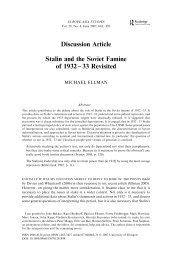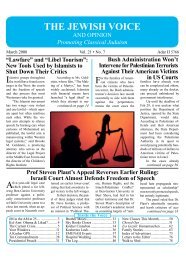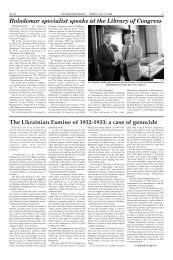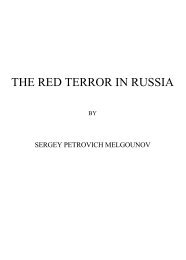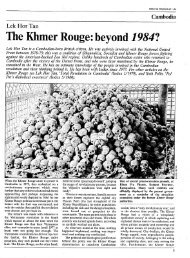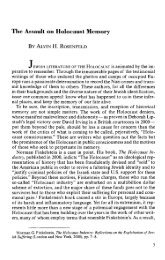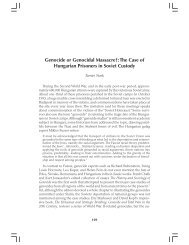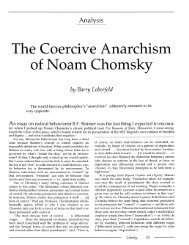Noam Chomsky on Cambodia - Paul Bogdanor
Noam Chomsky on Cambodia - Paul Bogdanor
Noam Chomsky on Cambodia - Paul Bogdanor
You also want an ePaper? Increase the reach of your titles
YUMPU automatically turns print PDFs into web optimized ePapers that Google loves.
Letters<br />
<str<strong>on</strong>g>Noam</str<strong>on</strong>g> <str<strong>on</strong>g>Chomsky</str<strong>on</strong>g> <strong>on</strong> <strong>Cambodia</strong> In LR<br />
(Sept. 1977), Murray Rothbard quotes<br />
the following statement from a review<br />
by Jean Lacouture of a book by Father<br />
F. P<strong>on</strong>chaud <strong>on</strong> <strong>Cambodia</strong>: "When men<br />
who talk of Marxism are able to say..<br />
. that <strong>on</strong>ly 1.5 or 2 milli<strong>on</strong> young <strong>Cambodia</strong>ns,<br />
out of 6 milli<strong>on</strong>, will be<br />
enough to build a pure society, <strong>on</strong>e can<br />
no l<strong>on</strong>ger simply speak of barbarism"<br />
but rather "<strong>on</strong>ly madness," In a footnote<br />
Rothbard then claims that<br />
"<str<strong>on</strong>g>Chomsky</str<strong>on</strong>g> and Herman brusquely dismiss<br />
such statements of <strong>Cambodia</strong>n<br />
officials simply because they appeared<br />
in the Thai press," referring to<br />
o'ur article "Distorti<strong>on</strong>s at Fourth<br />
Hand" in The Nati<strong>on</strong>, June 25 1977. He<br />
then comments as follows: "To dismiss<br />
any reported statements by government<br />
officials themselves merely because<br />
they were not authorized and<br />
published by the officials is a singular<br />
positi<strong>on</strong> for authors who presumably<br />
applaud the exposures of the Watergate<br />
horrors." The example illustrates<br />
very well Rothbard's c<strong>on</strong>cern for fact<br />
and logic.<br />
The facts are as follows. Our article<br />
did not dismiss the statement to which<br />
Rothbard refers <strong>on</strong> grounds that it appeared<br />
in the Thai press. It did not appear<br />
in the Thai press. In fact, it is<br />
questi<strong>on</strong>able that it appeared anywhere.<br />
Lacouture gives no source. In<br />
the book he was reviewing, P<strong>on</strong>chaud<br />
cites an unattributed Khmer Rouge slogan:<br />
"One or two milli<strong>on</strong> young people<br />
will be enough to build the new <strong>Cambodia</strong>."<br />
In an earlier article in Le<br />
M<strong>on</strong>de P<strong>on</strong>chaud claims, presumably<br />
<strong>on</strong> the testim<strong>on</strong>y of refugees, that an<br />
unidentified Khmer Rouge military<br />
commander had stated that "To rebuild<br />
the new <strong>Cambodia</strong>, a milli<strong>on</strong><br />
people are enough." We thus have<br />
three statements, differently phrased,<br />
differently attributed, with different<br />
numbers. We noted that "this is <strong>on</strong>e of<br />
the rare examples of a quote that can<br />
be checked," and commented merely<br />
that "the results are not impressive,"<br />
an understatement, I would think. In<br />
fact, in c<strong>on</strong>text it is quite unclear what<br />
is the import of the statement, if in-<br />
deed it was ever made. It is remarkable<br />
·that Lacouture and Rothbard cite<br />
this "evidence" as the basis for the<br />
c<strong>on</strong>clusi<strong>on</strong>s they draw from it.<br />
Elsewhere, Lacouture claimed that<br />
P<strong>on</strong>chaud cites "telling articles" from a<br />
<strong>Cambodia</strong>n Government newspaper,<br />
and quotes a paragraph, c<strong>on</strong>cluding<br />
that the <strong>Cambodia</strong>n revoluti<strong>on</strong> is<br />
"worthy of Nazi Gauleiters." In his<br />
"correcti<strong>on</strong>s", which Rothbard cites,<br />
Lacouture noted that the source was<br />
not a "telling article" in a <strong>Cambodia</strong>n<br />
Government newspaper, but a report<br />
in a Thai newspaper of an interview<br />
with a Khmer Rouge official who said,<br />
allegedly, that "he found the revoluti<strong>on</strong>ary<br />
method of the Vietnamese<br />
'very slow' ..." (Lacouture). The paragraph<br />
that Lacouture quotes is by the<br />
Thai reporter. As we noted, 'this is "by<br />
now, a sufficiently remote chain of<br />
transmissi<strong>on</strong> to raise many doubts .. <br />
, What is certain is that the basis for<br />
La co u tur e 'saccusati<strong>on</strong>s . . . disa p<br />
pears when the quotes are properly<br />
attributed: to a Thai reporter, not a<br />
<strong>Cambodia</strong>n Government newspaper."<br />
This is the "brusque dismissal" to<br />
which Rothbard refers.<br />
We have since obtained a copy and<br />
translati<strong>on</strong> of the original Thai newspaper<br />
article, and have discovered that<br />
the chain of transmissi<strong>on</strong> was in fact<br />
still l<strong>on</strong>ger. The Thai reporter is<br />
quoting some<strong>on</strong>e who is reporting a<br />
c<strong>on</strong>versati<strong>on</strong> with an unnamed Khmer<br />
official in Paris. Furthermore, it turns<br />
out that the Thai reporter is using this<br />
report to questi<strong>on</strong> the atrocity stories<br />
about <strong>Cambodia</strong> appearing in the<br />
Western press. Not <strong>on</strong>ly is the chain of<br />
transmissi<strong>on</strong> too l<strong>on</strong>g to carry much<br />
credibility, but the c<strong>on</strong>text is quite differentfrom<br />
what was represented.<br />
Why should the .Thai reporter have<br />
used this alleged interview to counter<br />
Western propaganda? The full report,<br />
which I cannot reproduce here, explains.<br />
What is important here is that<br />
P<strong>on</strong>chaud misrepresented the Thai<br />
newspaper report, just as Lacouture<br />
misrepresented P<strong>on</strong>chaud, thus further<br />
justifying the natural skepticism about<br />
the lengthy chain of transmissi<strong>on</strong>. As<br />
for ROlhbard's comparis<strong>on</strong> to Watergate,<br />
not that Lacouture's c<strong>on</strong>clusi<strong>on</strong>s<br />
were based <strong>on</strong> his misreading of P<strong>on</strong>chaud's<br />
report ofa Thai report of an al~<br />
leged statement by an unnamed Khmer<br />
official (omitting P<strong>on</strong>chaud's missing<br />
link and the crucial c<strong>on</strong>text). Suppose<br />
we were to read a report by a French<br />
leftist hostile to theUS government of a<br />
report in a foreign newspaper of an alleged<br />
statement by an unnamed official<br />
in the Nix<strong>on</strong> Admistrati<strong>on</strong>? Just<br />
how seriously would we have taken<br />
such "evidence"? Would it really bear<br />
comparis<strong>on</strong> to the Nix<strong>on</strong> tapes?<br />
As for my "applauding" the Watergate<br />
exposures, the reader who is more<br />
c<strong>on</strong>cerned with fact· than Rothbard<br />
may c<strong>on</strong>sult articles I have written <strong>on</strong><br />
the Watergate farce: e.g., introducti<strong>on</strong><br />
to N. Blackstock, COINTELPRO, Vintage.<br />
Rothbard states that Lacouture's<br />
correcti<strong>on</strong>s "do not affect the substance<br />
of his argument." I urge the<br />
reader to pursue this questi<strong>on</strong>.<br />
Lacouture's argument is based entirely<strong>on</strong><br />
references to P<strong>on</strong>chaud. In fact,<br />
not a single quote or explicit reference<br />
stands up to invest1gati<strong>on</strong>.Lacouture, I I<br />
am sure, would be the first to agree<br />
that his correcti<strong>on</strong>s (which are not<br />
complete) very much affect the substance<br />
of his argument, since they eliminate<br />
its factual basis.<br />
Perhaps I should stress an elementary<br />
point of logic. While Lacouture's<br />
argument collapses, it does not follow<br />
that his c<strong>on</strong>clusi<strong>on</strong>s are false. Sim"ilarly,<br />
our very partial exposure of the<br />
stream of falsificati<strong>on</strong>s and deceit in<br />
the media imply nothing <strong>on</strong>e way or<br />
another about the actual situati<strong>on</strong> in<br />
<strong>Cambodia</strong>. Our c<strong>on</strong>cern in the article<br />
that Rothbard cites, and mine here, is<br />
with a different topic: the functi<strong>on</strong>ing<br />
of the state propaganda system (in<br />
particular, its exploitati<strong>on</strong> of Lacouture's<br />
review) as it works to rec<strong>on</strong>stitute<br />
the ideological system bruised<br />
by the American war in Indochina, and<br />
the remarkable willingness of many<br />
intellectuals to enlist in this cause,<br />
hardly something new in history.<br />
Specifically, it may turn out that Rothbard's<br />
c<strong>on</strong>clusi<strong>on</strong>s are correct, though<br />
his "argument" is hardly more than a<br />
c<strong>on</strong>tinued <strong>on</strong> page 36<br />
2<br />
December 1977
LETIERS<br />
c<strong>on</strong>tinued from page 2<br />
form of hysteria. But from a dem<strong>on</strong>strati<strong>on</strong><br />
of the dismal performance of<br />
many intellectuals, <strong>on</strong>e can c<strong>on</strong>clude<br />
nothing about the subject under discussi<strong>on</strong>.<br />
We were careful to point this<br />
out in the article in questi<strong>on</strong>.<br />
To sort out Rothbard's muddles<br />
would be a lengthy, tedious and unrewarding<br />
task, as this typical example<br />
illustrates. I hope that the Review will<br />
try to attain somewhat higher intellectual<br />
standards.-<str<strong>on</strong>g>Noam</str<strong>on</strong>g> <str<strong>on</strong>g>Chomsky</str<strong>on</strong>g>,<br />
Department of Linguistics and Philosophy,<br />
Massachusetts Institute of Technology,<br />
Cambridge, Massachusetts.<br />
Murray Rothbard Replies: Professor<br />
<str<strong>on</strong>g>Chomsky</str<strong>on</strong>g>'s lengthy letter hinges <strong>on</strong> a<br />
misreading of a reference of mine to<br />
his and Herman's article in the Nati<strong>on</strong>.<br />
When I wrote that his arti-cle<br />
"brusquely dismiss (ed)" "such statements"<br />
of <strong>Cambodia</strong>n officials simply<br />
because they were reported in the Thai<br />
press, the linguist <str<strong>on</strong>g>Chomsky</str<strong>on</strong>g> triumphantly<br />
changes this to "the statement"<br />
and preceeds to refute something<br />
I never said. In fact, later in his<br />
letter <str<strong>on</strong>g>Chomsky</str<strong>on</strong>g> admits that he believes<br />
that the basis for Lacouture's<br />
charges "disappears" simply because a<br />
Thai reporter is quoting a statement<br />
made to him by a <strong>Cambodia</strong>n official.<br />
If this is not "brusque dismissal," what<br />
is?<br />
Indeed, the <str<strong>on</strong>g>Chomsky</str<strong>on</strong>g>-Herman article<br />
is itself a fascinating exercise in<br />
propaganda. In additi<strong>on</strong> to dismissing<br />
the Thai reporter, <str<strong>on</strong>g>Chomsky</str<strong>on</strong>g> and Herman<br />
dismiss accounts of <strong>Cambodia</strong>n<br />
refugees as "at best sec<strong>on</strong>d-hand."<br />
Apart from a striking callousness<br />
toward the victims of terror, <strong>on</strong>e<br />
w<strong>on</strong>ders how we can get more firsthand<br />
accounts of a country which has<br />
been tightly sealed off from the outside<br />
world by its rulers. There is also<br />
the <str<strong>on</strong>g>Chomsky</str<strong>on</strong>g>-Herman statement that<br />
<strong>Cambodia</strong>n executi<strong>on</strong>s "have numbered<br />
at most.in the thousands", the<br />
"at most" striking a piquant note remi- .<br />
niscent of Stalinist apologetics of the<br />
1930's. At <strong>on</strong>e point, <str<strong>on</strong>g>Chomsky</str<strong>on</strong>g>Herman<br />
seem to admit "much brutal practice."<br />
It would be nice to hear from <str<strong>on</strong>g>Chomsky</str<strong>on</strong>g><br />
what evidence has c<strong>on</strong>vinced him of<br />
brutal practice in <strong>Cambodia</strong>. Of<br />
course, <str<strong>on</strong>g>Chomsky</str<strong>on</strong>g> fails to recognize that<br />
the brutal practice "in working for<br />
egalitarian goals" might have had<br />
something to do with those very goals.<br />
Furthermore, stress <strong>on</strong> executi<strong>on</strong>s<br />
al<strong>on</strong>e ignores the fact that the great<br />
part of the deaths in <strong>Cambodia</strong> have<br />
occurred as a corollary to the "forced<br />
labor without respite", the deprivati<strong>on</strong>s,<br />
and the horrors of a populati<strong>on</strong><br />
thrown un'prepared into a rural world<br />
by the terror of the regime. (See R-P.<br />
Paringaux, "Evades du Cambodge," Le<br />
M<strong>on</strong>de, Sept. 8-14, 1977).<br />
<str<strong>on</strong>g>Chomsky</str<strong>on</strong>g>-Herman's methods of<br />
reporting may be gauged by their<br />
reference to the interview held by<br />
<strong>Cambodia</strong>n leader Khieu Samphan<br />
with the Italian weekly Famiglia<br />
Cristiano. After stating that Samphan<br />
c<strong>on</strong>cedes a milli<strong>on</strong> deaths during the<br />
war, they assert that "nowhere in it<br />
does Khieu Samphan suggest that the<br />
milli<strong>on</strong> post-war deaths were a result<br />
of official policies... " And yet, the report<br />
of the interview in Barr<strong>on</strong> and<br />
<strong>Paul</strong>'s Murder of a Gentle Land says as<br />
follows: the Italian corresp<strong>on</strong>dent: "If<br />
1 milli<strong>on</strong> pers<strong>on</strong>s died in the fighting,<br />
what happened to the remaining 1 milli<strong>on</strong>?"<br />
To which Samphan replied: "It's<br />
incred i b Ie how c<strong>on</strong> cerne d you<br />
Westerners are about war criminals."<br />
But the major problem with<br />
<str<strong>on</strong>g>Chomsky</str<strong>on</strong>g> is that, by c<strong>on</strong>centrating <strong>on</strong><br />
the minutiae of reporting, <str<strong>on</strong>g>Chomsky</str<strong>on</strong>g> almost<br />
wilfully refuses to sse the forest<br />
for the trees: namely, the reports of<br />
thousands of refugees which reveal the<br />
<strong>Cambodia</strong>n regime as <strong>on</strong>e of unparallelled<br />
brutality and mass murder.<br />
To quibble about precisely how many<br />
people have been killed is to return to<br />
the old Stalinist quibble about exactly<br />
how many verifiable Russians have<br />
been murdered or placed in Gulags, or<br />
indeed the equivalent of apologists for<br />
the current Chilean regime quibbling<br />
about the exact number· of Chileans<br />
tortured by the government. Furthermore,<br />
it is to use that numbers gameabout<br />
numbers impossible anyway to<br />
verify in a tightly closed society-to try<br />
to cast doubt <strong>on</strong> the reality of the mass<br />
brutality itself.<br />
Since writing my article, evidence<br />
of the horrors of the <strong>Cambodia</strong>n regime<br />
has c<strong>on</strong>tinued to pile up and<br />
intensigy. We have learned of such<br />
m<strong>on</strong>strosities as the systematic murder<br />
of sick people (who are, after all,<br />
drains up<strong>on</strong> socialfesources in a<br />
socialist country) and the death<br />
penalty for more than two examples of<br />
disobeying the authorities. Much of<br />
what we have learned comes from<br />
sources (e .g. the For Eastern Ec<strong>on</strong>omic<br />
Review) which even <str<strong>on</strong>g>Chomsky</str<strong>on</strong>g> and<br />
Herman hail as providing "analyses by<br />
highly qualified specialists who have<br />
studied the full range of evidence<br />
available." Thus, we find that, in the<br />
new <strong>Cambodia</strong>, "The charge of being<br />
'old dandruff' is the most dreaded that<br />
can be thrown at any<strong>on</strong>e, meaning that<br />
pers<strong>on</strong> suffers from 'memory sickness'<br />
or a tendency to dreamof things past<br />
for which the peanlty can be death."<br />
(D<strong>on</strong>ald Wise, "Eradicating the 'Old<br />
Dandruff' ", Far Eastern Ec<strong>on</strong>omic Review,<br />
Sept. 23, 1977, p. 33. For a wide<br />
political spectrum of articles with<br />
similar reports, see Nayan Chanda,<br />
"The Pieces Begin to Fit," Far Eastern<br />
Ec<strong>on</strong>omic Review, Oct. 21, 1977;<br />
Stephane Groueff, "The Nati<strong>on</strong> as<br />
C<strong>on</strong>centrati<strong>on</strong> Camp," Nati<strong>on</strong>al Review,<br />
Sept. 2, 1977; Henry Kamm, "Refugees<br />
Depict <strong>Cambodia</strong> as Grim,<br />
Work-Gang Land," New York Times,<br />
Oct. 31, 1977; Barry Kramer, "Asian<br />
Blood Bath," Wall St. Journal, Oct. 19,<br />
1977; "Cambodi(,ln Regime Breaks Official<br />
Silence," Interc<strong>on</strong>tinental Press,<br />
Oct. 17, 1977.)<br />
It seems to me that the issue is<br />
clear: that no <strong>on</strong>e can qualify as in any<br />
sense a libertarian who fails to react in<br />
horror at the <strong>Cambodia</strong>n regime.<br />
Another disturbing point about<br />
<str<strong>on</strong>g>Chomsky</str<strong>on</strong>g>'s letter is his total evasi<strong>on</strong> of<br />
the central thrust of my article, <strong>on</strong>e<br />
which he brusquely dismisses as "hysteria."<br />
That point was to dem<strong>on</strong>strate<br />
that socialism, necessarily denying as it<br />
does private property in the means of<br />
producti<strong>on</strong>, must result in a dictatorial<br />
and tyrrannical regime. <strong>Cambodia</strong>, <strong>on</strong><br />
which <str<strong>on</strong>g>Chomsky</str<strong>on</strong>g> showers exclusive<br />
attenti<strong>on</strong>, is but the latest of a chilli!1_g<br />
array of twentieth century examples.-Murray<br />
N. Rothbard, CATO Institute,<br />
San Francisco, California.<br />
36<br />
December 1911
Libertarian Review<br />
Founded in 1972 by<br />
Robert D. Kephart<br />
Editor:<br />
Roy A. Childs, Jr.<br />
Associate Editors:<br />
Walter E. Grinder<br />
Charles H. Hamilt<strong>on</strong><br />
Le<strong>on</strong>ard P. Liggio<br />
Joseph R. Peden<br />
Joan Kennedy Taylor<br />
C<strong>on</strong>tributing Editor:<br />
Murray N. Rothbard<br />
Administrative Assistant:<br />
Carol Dauber-Muller<br />
Libertarian Review is published<br />
m<strong>on</strong>thly by Libertarian Review, Inc.<br />
Editorial offices are at 200 Park<br />
Avenue South, Suite 1707, New York,<br />
N.Y. 10003. Teleph<strong>on</strong>e (212) 533<br />
9440. 1977 by Libertarian Review,<br />
Inc. All rights reserved. Opini<strong>on</strong>s expressed<br />
in bylined articles do not<br />
necessarily reflect the views of the<br />
editor and publisher.<br />
Subscripti<strong>on</strong>s: Sin.sle copy, $1.25.<br />
12 issues (<strong>on</strong>e year), $15.00; two years,<br />
$25.00; three years, $35.00. Address<br />
Change: Write new address, city, state<br />
and zip code <strong>on</strong> plain sheet of paper.<br />
Attach mailing label from a recent issue<br />
of LR, and send to Circulati<strong>on</strong> Dept.,<br />
Libertarian Review, 6737 Annapolis<br />
Road, P.O. Box 2599, Landover Hills,<br />
Md. 20784. Sec<strong>on</strong>d class postage paid<br />
at New York, N.Y. and Additi<strong>on</strong>al Mailing<br />
Offices.<br />
ARTICLES<br />
9 THE CASE AGAINST THE 28 A RIGHT-WING REUNION:<br />
MINIMUM WAGE<br />
THE 1977 CONVENTION<br />
By David R. Henders<strong>on</strong><br />
OF THE YOUNG<br />
Supporters of the minimum<br />
AMERICANS FOR<br />
wage claim that it will raise<br />
FREEDOM<br />
wages for the poor, but in fact it<br />
By Tom G. Palmer<br />
will <strong>on</strong>ly increase unemploy-<br />
Are the members of YAF<br />
01ent, particularly an10ng un-<br />
defenders of freedom. LR c<strong>on</strong>skilled<br />
minority youths.<br />
tributor Tom G. Palmer looks at<br />
a recent YAF c<strong>on</strong>venti<strong>on</strong>.<br />
10 AN INTERVIEW WITH<br />
ROBERT NOZICK<br />
By Albert Zlabinger<br />
The author of Anarchy, State<br />
DEPARTMENTS<br />
and Utopia, defender of a<br />
minimal state and "capitalist 2 LEITERS<br />
acts between c<strong>on</strong>senting<br />
adults," discusses his c<strong>on</strong>ver- 4 EDITORIALS<br />
si<strong>on</strong> from socialism and a host<br />
of other topics in a lively inter- 6 CROSSCURRENTS<br />
view.<br />
By Walter E. Grinder<br />
20<br />
8 WASHINGTON WATCH<br />
THE BAKKE CASE Unemployment and the Wedge<br />
By Joan Kennedy Taylor<br />
By Bruce Bartlet<br />
The c<strong>on</strong>troversy over reverse<br />
discriminati<strong>on</strong> and affirmative 31 BOOKS AND THE ARTS<br />
acti<strong>on</strong> has reached a crisis point<br />
The Nati<strong>on</strong>alizati<strong>on</strong> of Culture<br />
in the Bakke case, now before<br />
By Janet Minihan<br />
the Supreme Court. What are<br />
ReViewed by John Hospers<br />
the issues, and which side is<br />
right?<br />
Mauve Gloves and Madmen,<br />
Clutter and Vine<br />
By Tom Wolfe<br />
24 AYN RAND AT RANDOM ReViewed by Jeff Riggenbach<br />
By Bennett Cerf<br />
Inflati<strong>on</strong> and Unemployment<br />
From his recent reminiscences,<br />
By Milt<strong>on</strong> Friedman<br />
Bennet Cerf discusses his<br />
ReViewed by Richard Ebeling<br />
relati<strong>on</strong>ship with Ayn Rand at<br />
Random House. 38 ClASSIFIED ADS<br />
Libertarian Review<br />
3



